AMD Zen 3 Ryzen Deep Dive Review: 5950X, 5900X, 5800X and 5600X Tested
by Dr. Ian Cutress on November 5, 2020 9:01 AM ESTCPU Tests: Synthetic
Most of the people in our industry have a love/hate relationship when it comes to synthetic tests. On the one hand, they’re often good for quick summaries of performance and are easy to use, but most of the time the tests aren’t related to any real software. Synthetic tests are often very good at burrowing down to a specific set of instructions and maximizing the performance out of those. Due to requests from a number of our readers, we have the following synthetic tests.
Linux OpenSSL Speed: SHA256
One of our readers reached out in early 2020 and stated that he was interested in looking at OpenSSL hashing rates in Linux. Luckily OpenSSL in Linux has a function called ‘speed’ that allows the user to determine how fast the system is for any given hashing algorithm, as well as signing and verifying messages.
OpenSSL offers a lot of algorithms to choose from, and based on a quick Twitter poll, we narrowed it down to the following:
- rsa2048 sign and rsa2048 verify
- sha256 at 8K block size
- md5 at 8K block size
For each of these tests, we run them in single thread and multithreaded mode. All the graphs are in our benchmark database, Bench, and we use the sha256 and md5 results in published reviews.
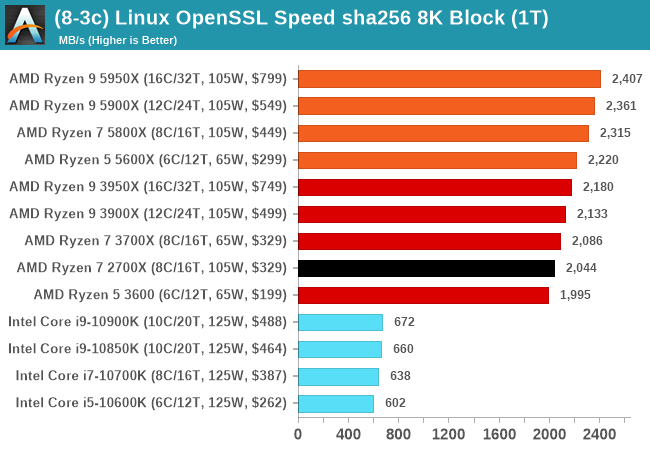
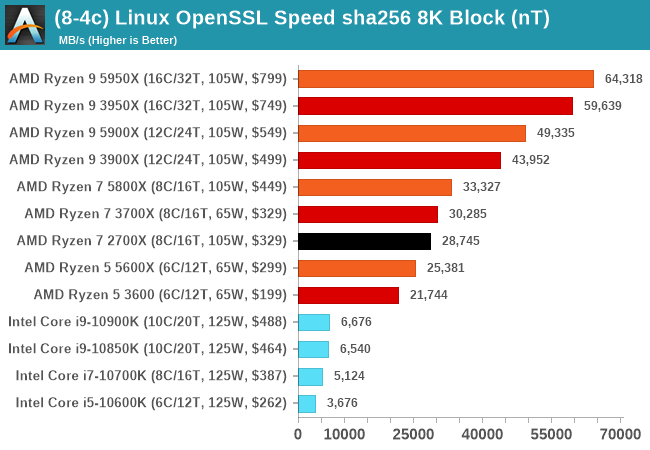
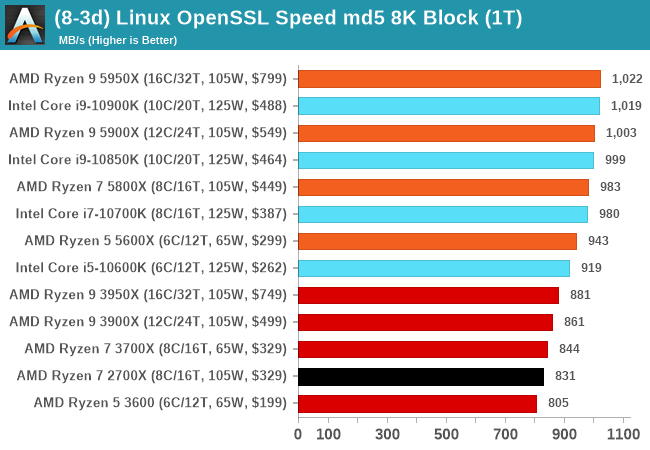
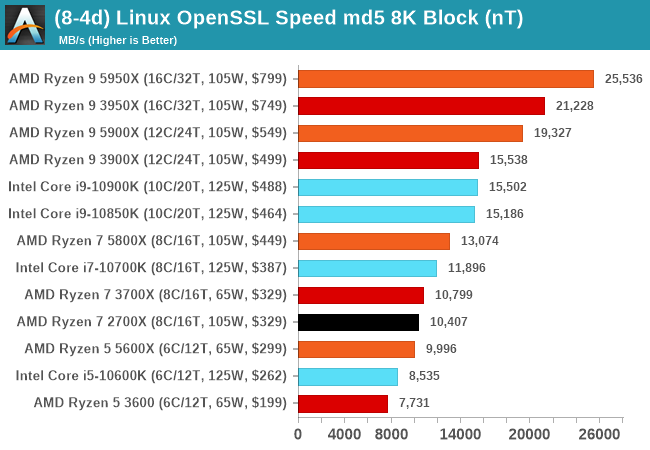
GeekBench 5: Link
As a common tool for cross-platform testing between mobile, PC, and Mac, GeekBench is an ultimate exercise in synthetic testing across a range of algorithms looking for peak throughput. Tests include encryption, compression, fast Fourier transform, memory operations, n-body physics, matrix operations, histogram manipulation, and HTML parsing.
I’m including this test due to popular demand, although the results do come across as overly synthetic, and a lot of users often put a lot of weight behind the test due to the fact that it is compiled across different platforms (although with different compilers).
We have both GB5 and GB4 results in our benchmark database. GB5 was introduced to our test suite after already having tested ~25 CPUs, and so the results are a little sporadic by comparison. These spots will be filled in when we retest any of the CPUs.
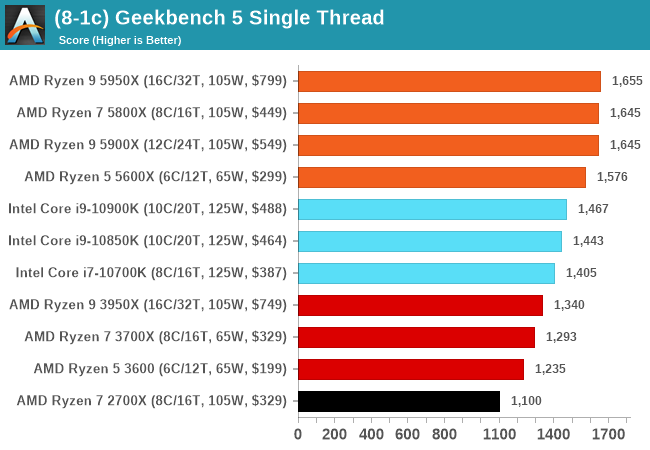
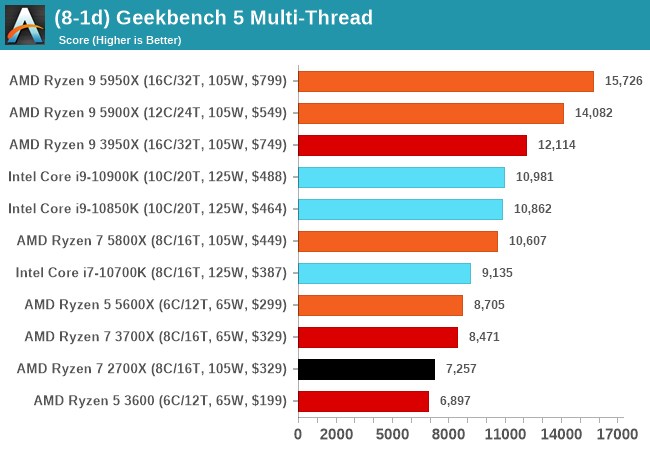










339 Comments
View All Comments
5j3rul3 - Thursday, November 5, 2020 - link
Rip Intel🤩🤩🤩Smell This - Thursday, November 5, 2020 - link
Chipzillah has got good stuff ... everyone is "just dandy" for the most part...
but, AMD has kicked Intel "night in the ruts" in ultimate price/performance with Zen3
Kangal - Saturday, November 7, 2020 - link
True, but the price hikes really hurt.For the Zen3 chips, it's only worth getting the:
- r9-5950X for the maximum best performance
- r5-3600X for the gaming performance (and decent value).
The 12 core r9-5900X is a complete no-buy. Whilst the r7-5800X is pretty dismal too, so both chips really need to be skipped. Neither of them have an Overclocking advantage. And there's just no gaming advantage to them over the 5600X. For more performance, get a 3950X or 5950X. And when it comes to productivity, you're better served with the Zen2 options. You can get the 3700 for much cheaper than the 5800X. Or for the same price you can get the 3900X instead.
Otherwise, if you're looking for the ultimate value, as in something better than the 5600X value... you can look at the 3600, 1600f, 3300X, 3100 chips. They're not great for gaming/single-core tasks, but they're competent and decent at productivity. Maybe even go into the Used market for some 2700X, 2700, 1800X, 1700X, 1700, 1600X, and 1600 chips as these should be SIGNIFICANTLY cheaper. Such aggressive pricing puts these options at better value for gaming (surprising), and better value for productivity (unsurprising).
DazzXP - Saturday, November 7, 2020 - link
Price hike doesn't really hurt that much, AMD was making very little money on their past Ryzen's because they had to contend with Intel Mindshare and throw more cores in as they did not quite have IPC and clock speeds, now they have all. It was as expected to be honest.Silma - Sunday, November 8, 2020 - link
Do you have any recommendations for motherboards for either a Zen3 or a Zen 2 (depending on availability of processors)? I want to spend as litte as possible on it, but it miust be compatible with 128 GB of RAM.AdrianBc - Sunday, November 8, 2020 - link
If you really intend to use 128 GB of RAM at some point in the future, you should use ECC RAM, because the risk of errors is proportional with the quantity of RAM.A good motherboard was ASUS Pro WS X570-ACE (which I use) previously at $300 but right now it is available at much higher prices ($370), for some weird reason.
If you want something cheap with 128 GB and ECC support, the best you can do is an ASRock micro-ATX board with the B550 chipset. There are several models and you should compare them. For example an ASRock B550M PRO4 is USD 90 at Amazon.
Silma - Wednesday, November 11, 2020 - link
Thanks for the input! Is ECC really necessary? The primary objective of the PC memory would be loading huge sound libraries in RAM for orchestral compositions. The PC would serve at the same time as gaming PC + Office PC.Spunjji - Sunday, November 8, 2020 - link
In the context of a whole system? Not really, no.In the context of an upgrade? Not at all, if you have a 4xx board you'll be good to go in January without having to buy a new board. That's something that hasn't been possible for Intel for a while, and won't be again until around March, when you'll be able to upgrade from a mediocre power hog of a chip to a more capable power hog of a chip.
Comparing new to used in terms of value of a *brand new architecture* doesn't really make much sense, but go for it by all means 👍 The fact remains that these have the performance to back up the cost, which you can see in the benchmarks.
leexgx - Sunday, November 8, 2020 - link
I would aim for the 5600x minimum unless your really trying to Save $100 as the 5600x is a good jump over the 3700x/3600xbiostud - Monday, November 9, 2020 - link
Uhm, no? For me the 5900X would make perfect sense. I game and work with/photo video editing, and would like to have my computer for a long time. The 5950X costs too much for my needs, the 5900X offers 50% more cores than the 5800X for $100 and the 5600X hasn't got enough cores when video editing. (Although I'm waiting for next socket before upgrading my 5820k)